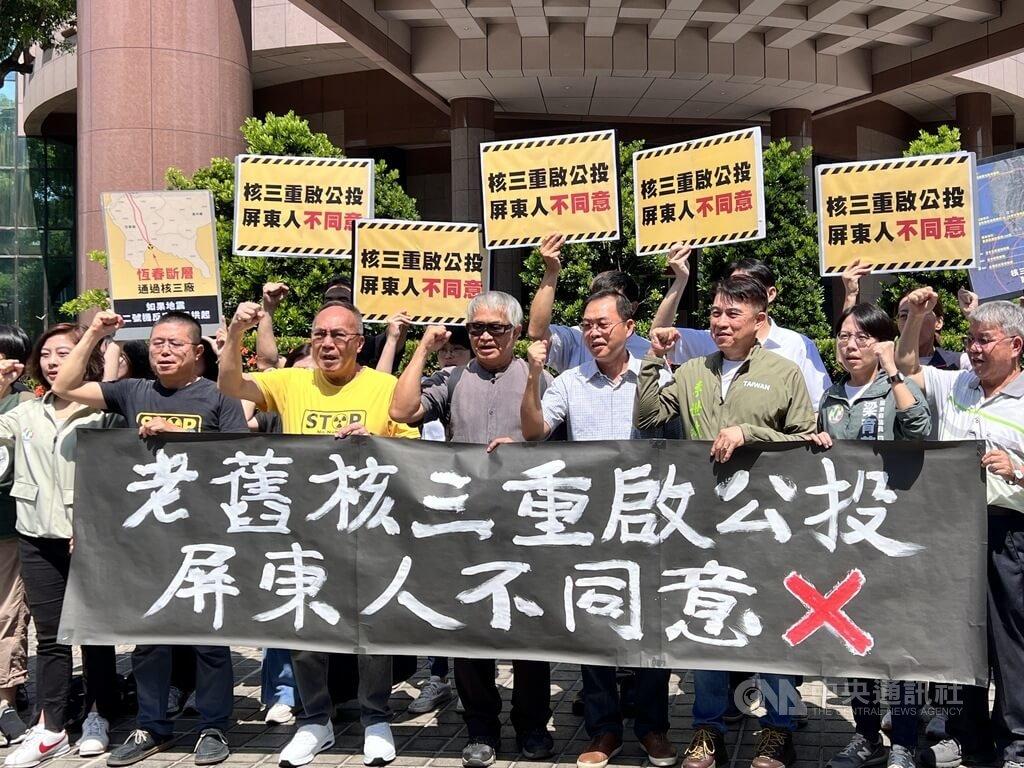Pingtung County residents today protested against a national referendum that could lead to the reactivation of the Ma-anshan Nuclear Power Plant.
Holding banners outside the Pingtung County Council, more than 20 people criticized the Chinese Nationalist Party (KMT) and Taiwan People's Party for proposing the referendum without consulting locals.
Executive Yuan spokeswoman Michelle Lee (李慧芝) last week said that the referendum would read: “Do you agree that the Ma-anshan Nuclear Power Plant should resume operations, provided it is deemed safe by the relevant authorities?”

Photo: CNA
The nuclear plant — which operated for 40 years before being shut down in May — is located on a geological fault line, said Chiang Kuo-liang (江國樑), honorary chairman of a Pingtung culture and education development association.
While it was operational, the plant's safety relied on "the blessings of the gods," Chiang said sarcastically.
The plant's aging equipment, seismic resistance and nuclear waste disposal are all critical issues that must be addressed before it can be restarted, said Lin Ya-wen (林雅文), president of a community college.
Citing Japan's Fukushima Dai-ichi nuclear power plant disaster, bookstore founder Weng Chen-hsia (翁禎霞) said that such incidents affect generations to come.
"Energy issues are complicated matters that require immediate attention and should not be decided by a hasty referendum," Weng said.
The issue is about people’s rights and should not be voted on, said Pingtung County Councilor Hung Ming-chiang (洪明江), a member of the Democratic Progressive Party.
Pingtung residents have lived in fear for 40 years, and they have the right to oppose reactivating the nuclear power plant, he said.
The main text of the referendum is unreasonable, Citizen of the Earth, Taiwan director Lee Ken-cheng (李根政) said.
No one can ensure the nuclear power plant is absolutely safe, he said, urging people to vote “no.”
Five public forums are to be held from Aug. 7 to discuss the proposal to restart the Ma-anshan Nuclear Power Plant, ahead of the referendum on Aug. 23, the Central Election Commission has said.
Additional reporting by Fion Khan

A preclearance service to facilitate entry for people traveling to select airports in Japan would be available from Thursday next week to Feb. 25 at Taiwan Taoyuan International Airport, Taoyuan International Airport Corp (TIAC) said on Tuesday. The service was first made available to Taiwanese travelers throughout the winter vacation of 2024 and during the Lunar New Year holiday. In addition to flights to the Japanese cities of Hakodate, Asahikawa, Akita, Sendai, Niigata, Okayama, Takamatsu, Kumamoto and Kagoshima, the service would be available to travelers to Kobe and Oita. The service can be accessed by passengers of 15 flight routes operated by

Alain Robert, known as the "French Spider-Man," praised Alex Honnold as exceptionally well-prepared after the US climber completed a free solo ascent of Taipei 101 yesterday. Robert said Honnold's ascent of the 508m-tall skyscraper in just more than one-and-a-half hours without using safety ropes or equipment was a remarkable achievement. "This is my life," he said in an interview conducted in French, adding that he liked the feeling of being "on the edge of danger." The 63-year-old Frenchman climbed Taipei 101 using ropes in December 2004, taking about four hours to reach the top. On a one-to-10 scale of difficulty, Robert said Taipei 101

Taiwanese and US defense groups are collaborating to introduce deployable, semi-autonomous manufacturing systems for drones and components in a boost to the nation’s supply chain resilience. Taiwan’s G-Tech Optroelectronics Corp subsidiary GTOC and the US’ Aerkomm Inc on Friday announced an agreement with fellow US-based Firestorm Lab to adopt the latter’s xCell, a technology featuring 3D printers fitted in 6.1m container units. The systems enable aerial platforms and parts to be produced in high volumes from dispersed nodes capable of rapid redeployment, to minimize the risk of enemy strikes and to meet field requirements, they said. Firestorm chief technology officer Ian Muceus said

MORE FALL: An investigation into one of Xi’s key cronies, part of a broader ‘anti-corruption’ drive, indicates that he might have a deep distrust in the military, an expert said China’s latest military purge underscores systemic risks in its shift from collective leadership to sole rule under Chinese President Xi Jinping (習近平), and could disrupt its chain of command and military capabilities, a national security official said yesterday. If decisionmaking within the Chinese Communist Party has become “irrational” under one-man rule, the Taiwan Strait and the regional situation must be approached with extreme caution, given unforeseen risks, they added. The anonymous official made the remarks as China’s Central Military Commission Vice Chairman Zhang Youxia (張又俠) and Joint Staff Department Chief of Staff Liu Zhenli (劉振立) were reportedly being investigated for suspected “serious